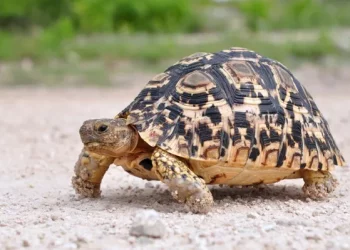Sulcata tortoises, also known as African spurred tortoises, are the third-largest species of tortoise in the world and can weigh over 100 pounds when fully grown. As herbivores, they require a diet that is high in fiber, calcium, and other essential nutrients to maintain optimal health.
Here, we’ll provide a comprehensive list of what sulcata tortoises can eat and what should be avoided.
-
Grasses and Hay
Grasses and hay should make up the majority of a sulcata tortoise’s diet. This includes Bermuda grass, timothy hay, orchard grass, and alfalfa hay. Fresh grasses can be found in the wild or purchased from a pet store, while hay can be purchased in bales or as pre-packaged hay cubes.
-
Leafy Greens
Leafy greens are an essential part of a sulcata tortoise’s diet. These include collard greens, mustard greens, turnip greens, kale, and dandelion greens. These greens are high in fiber, calcium, and other essential nutrients that are necessary for a healthy tortoise.
-
Vegetables
Sulcata tortoises can also eat a variety of vegetables, including carrots, squash, zucchini, bell peppers, and green beans. These vegetables should be offered in moderation, as they are high in water and can cause diarrhea if given in excess.
-
Fruits
Fruits should be given in moderation, as they are high in sugar. Apples, pears, bananas, and berries are all good options for sulcata tortoises. Fruits should be given as treats and should not make up more than 10% of a tortoise’s diet.
-
Commercial Tortoise Pellets
Commercial tortoise pellets can be used to supplement a sulcata tortoise’s diet. These pellets are specially formulated to meet the nutritional needs of tortoises and can be found at most pet stores. However, they should not make up the majority of a tortoise’s diet and should only be given in moderation.
-
Calcium Supplements
Calcium supplements should be offered to sulcata tortoises on a regular basis. This is especially important for growing tortoises and those that are not getting enough calcium in their diet. Calcium supplements can be in the form of calcium powder or cuttlebone.
Now that we’ve discussed what sulcata tortoises can eat, let’s talk about what should be avoided.
-
High-Fat Foods
Sulcata tortoises should avoid high-fat foods such as cheese, nuts, and seeds. These foods can lead to obesity and other health problems if given in excess.
-
Processed Foods
Processed foods should be avoided as they are often high in salt, sugar, and other unhealthy ingredients. This includes human foods such as bread, cereal, and chips.
-
Animal Products
Sulcata tortoises are herbivores and should not be given animal products such as meat, eggs, or dairy. These foods can be difficult for tortoises to digest and can lead to health problems.
-
Poisonous Plants
Sulcata tortoises should not be given any plants that are poisonous or toxic to them. This includes plants such as nightshade, oleander, and azalea.
In conclusion, a sulcata tortoise’s diet should consist of a variety of grasses, hay, leafy greens, vegetables, and fruits. Commercial tortoise pellets and calcium supplements can also be used to supplement their diet. It’s important to avoid high-fat foods, processed foods, animal products, and poisonous plants. With a healthy and varied diet, sulcata tortoises can


























